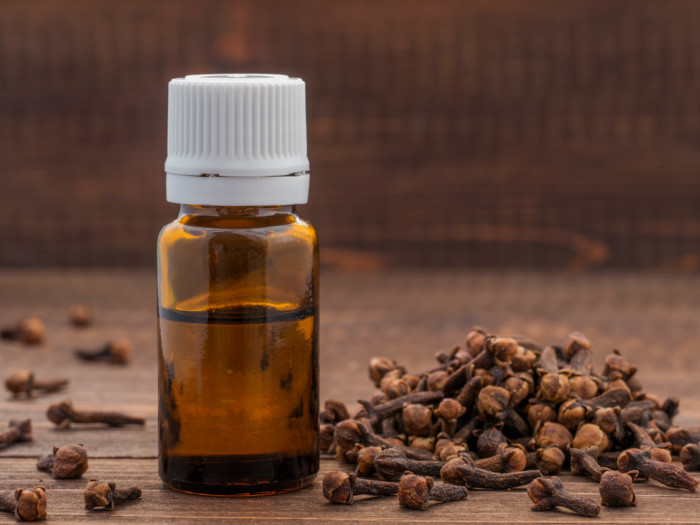Countless people turn to essential oils for sinus infection, as many of these powerful oils possess antibacterial, antiviral, anti-inflammatory, antiseptic, expectorant, astringent and decongestant properties. Sinus infections, also known as sinusitis, are defined by inflammation or irritation of the tissue that cover the sinus cavities, which can also become blocked during serious sinus infections. These cavities are behind, above and to the side of the nose. When an infection attacks these areas, it can be painful, difficult to breathe, and characterized by similar symptoms to the common cold, including runny nose, congestion, headaches, tension between the eyes and sensitivity or pain in these areas. Sinusitis can be caused by any bacterial, viral or fungal accumulation in the sinus cavities, and they can be very difficult to treat.
Sinusitis comes in several forms, either acute sinusitis, subacute sinus inflammation, chronic inflammation of the sinuses or recurrent sinusitis. These can last for anywhere from days to months, and can seriously impact the quality of life for people constantly dealing with sinus infections. Although most of the symptoms appear to be those of a normal cold, including mucus production and congestion, sinus infections often differentiate themselves with facial pain and sensitivity, loss of smell, bad breath, exhaustion, fever or pain in the gums/teeth. Given how difficult it can be to completely eliminate sinus infections, particularly for people who suffer from chronic varieties of this disease, many people choose to use powerful essential oils for a sinus infection. [1]
List of Best Essential Oils for Sinus Infection
Of the hundreds of oils available for use, the best essential oils for sinus infection are chamomile, sweet basil, rosemary, lemon, pine, peppermint, geranium, menthol, clove and tea tree oils.
Geranium Oil
Known for its analgesic and anti-inflammatory properties, this essential oil can quickly relieve the pressure of sinus infections while clearing breathing airways and helping you function more normally as your body fights the infection. [2]
How to Use – You can apply this oil in small amounts (2-3 drops) on either side of the nose, directly above two of your main sinuses. The oil will be absorbed and begin acting shortly after application and can be reapplied 2-3 times per day until your symptoms subside.
Menthol Oil
When it comes to sinus clearing essential oils, menthol is found more effective than some essential oils. The aromatic compounds alone are enough to cool inflamed patches of tissue, while the antiseptic properties will help to seek out and eliminate any underlying infections in the nose or respiratory tracts. [3]
How to Use – This oil is commonly rubbed directly on the chest, neck, or area above the top lip, as it can then be inhaled into the sinus cavities, even while you sleep, to soothe discomfort and inflammation.
Chamomile Oil
Boasting sedative and antiseptic compounds, chamomile oil can not only soothe tension in the sinuses, thus relieving tension and pain, but it can also attack the infection that is causing the discomfort in the first place. [4]
How to Use – Undiluted forms of this oil – in small quantities – can be applied beneath the nose or rubbed on the cheeks and sinuses, including the temples, for a comprehensive approach to treating sinus infections.
Rosemary Oil
With pain-relieving qualities, this oil can help relieve tension between the eyes and soothe sinus headaches, while also eliminating blockage due to its expectorant qualities, helping you breathe normally as you recover. [5]
How to Use – Blending rosemary oil with peppermint oil can make a refreshing and rejuvenating mixture that can be massaged into the temples and sinuses to relieve pain and sinus blockage.

Blocked nose? Try a saline spray and stay hydrated. Photo Credit: Shutterstock
Lemon Oil
Packed with vitamins and antioxidants, as well as anti-inflammatory compounds, lemon oil is one of the best antimicrobial essential oils on the market. This can help clear your sinuses and speed the recovery time from sinus infections. [6]
How to Use – It is most effective when inhaled, either directly from the bottle or when a few drops are added to a pot of steaming water, you cover your head with a towel and then breathe deeply from the aromatic compounds of lemon oil.
Peppermint Oil
With antiviral, antibacterial and anti-inflammatory compounds, this oil is known to soothe irritation and slightly numb areas of the sinuses, making you less susceptible to itching, sneezing and mucus secretion, while also attacking the underlying infection. [7]
How to Use – For long-term protection or treatment of sinus infections, diffuse a few drops of this oil in your home every day, but for more acute sinus infections, inhale directly from the bottle or add 4-5 drops to a steam inhalation treatment.
Tea Tree Oil
Legendary for its impact on the immune system, thanks to its antiviral, anti-inflammatory and antibacterial properties, tea tree oil is able to soothe many of the symptoms of sinus infections, helping to clear up congestion and open the airways for normal breathing. [8]
How to Use – Always dilute tea tree oil before applying on the body, typically with sweet almond or coconut oil. Then, apply a small amount of this oil directly beneath the nose, massage it onto the sinuses, or rub it thoroughly into the temples for comprehensive relief.
Sweet Basil Oil
Tightness in the sinus cavities will often result in headaches, or even migraines, but that pressure can be relieved with the use of sweet basil oil. More importantly, the analgesic nature of this oil can soothe discomfort and give your body time and energy to heal. [9]
How to Use – Add this powerful oil to a room diffuser for rapid relief from headache pain and sinus pressure and for even faster relief, simply inhale deeply from a bottle of this essential oil.
Pine Oil
This essential oil has expectorant and decongestant properties, which can help to clear out mucus and phlegm accumulation in the respiratory tracts. This can prevent bacterial or viral infections from taking up residence there, which can speed healing significantly. [10]
How to Use – Apply 2-3 drops of pine oil beneath the nose where it can be inhaled for all-day relief, or simply add a few drops to a room diffuser; this can quickly and effectively relieve pressure and dry up your mucus membranes.

Clove oil helps relieve toothache. Photo Credit: Shutterstock
Clove Oil
Known as one of the best essential oils for a sinus infection, clove oil has anti-inflammatory, analgesic, expectorant, antiseptic and antioxidant properties, meaning it can do everything from treating the symptoms of sinus infections to seeking out and destroying the underlying pathogens causing your discomfort in the first place. [11]
How to Use – Although many people choose to dilute this oil with coconut or olive oils, it can also be used in undiluted form, either applied directly to the sides of the nose and sinuses, or added to a room diffuser for long-term treatment of this chronic condition.
A Word of Warning
Inhaling, diffusing, consuming and topically applying various essential oils for sinus infection can be very effective to treat the symptoms and underlying infection, but there are also some notable risks to using essential oils. These are extremely concentrated substances with a number of volatile compounds and active ingredients, some of which can cause inflammation or irritation, particularly in and around the mucus membranes of the body. Before using essential oils to treat sinus infections, be sure to speak with your doctor especially if you are already taking antibiotics or other medications. Furthermore, this condition can eventually cause more serious impacts on breathing and vision when left untreated. If sinus infections persist for months at a time and if at-home remedies don’t help, seek out formal medical attention and antibiotics.
